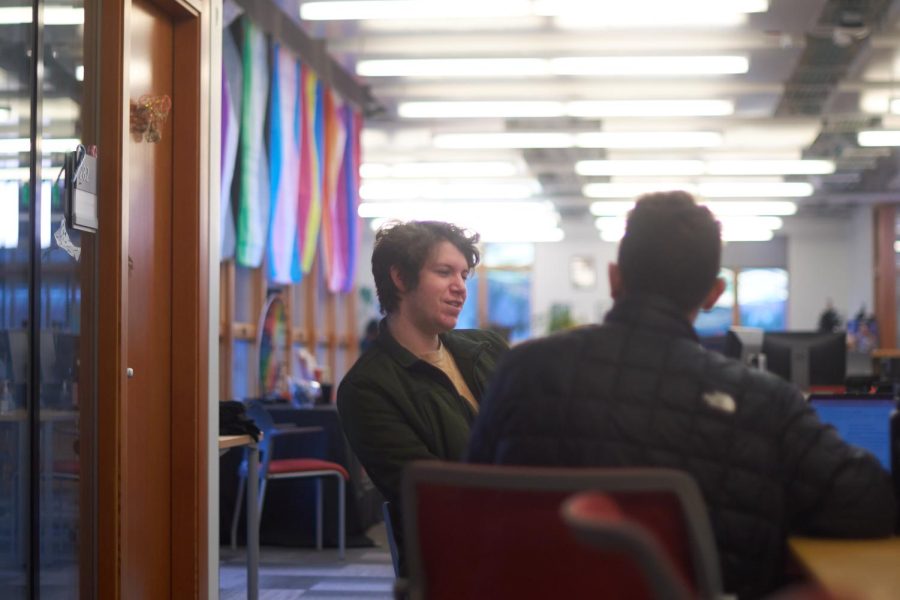ASOSU President looks to increase maximum hour per week allowed for on-campus student employees
ASOSU President, Matteo Paola, speaking with OMN writer, Nino Paoli in the ASOSU offices in the Student Experience Center, Dec 9. ASOSU officials have been discussing several initiatives which could affect student workers.
January 5, 2023
The Associated Students of Oregon State University will meet in January to finalize a plan that will increase the allowable maximum hours for on-campus student workers starting the next academic year, as part of a push to further improve student worker rights.
President of ASOSU Matteo Paola said that an increase in the maximum weekly hours for student workers had been a frequent topic of discussion within ASOSU during the past two years, while he was a member of the ASOSU House of Representatives.
Now, Paola is spearheading the proposal of a pilot program, which will allow student workers to work up to 24 hours per week starting in fall of 2023.
“Of the people that are working, there are a lot that would be willing to work over 20 hours a week,” Paola said. “A lot work 20 hours a week on campus, and then they also work off campus just to get enough money to survive; but that’s not ideal, if you could do it all on campus instead, would be preferable.”
Paola explained that the increase may also alleviate some stress from on-campus employers as well.
“There’s a lot of worker shortages (on campus),” Paola said. “But there are definitely a lot (of students) that work up to 20 hours that would be willing to go more, and there are employers that are willing to pay for more hours.”
Natalia Catena, a senior and student worker at Java II in The Valley Library, fully endorses this change.
“I never understood the 20-hour cap, personally,” Catena said. “I know people work one or two other jobs off campus also, besides this job, so I feel like if people could get all the hours they need working one job here, why not do that for them?”
Catena noted that on-campus student workers enjoy generally higher wages and tax exemptions as well.
Although the minimum hourly wage in Benton County increased from $12.75 to $13.50 on July 1, 2022, OSU student workers’ minimum wage is now $15.00 or $15.15, depending on if a student worker is under a student fee funded entity or not.
This increase in minimum wage was established last academic year after ASOSU increased minimum wage for student fee funded entities – ASOSU, the Memorial Union, Student Experience and Engagement, Intercollegiate Athletics, Family Resource Center, Human Services Resource Center Recreational Sports and performing arts – to $15, which in turn, pushed Student Affairs to increase their student worker wages to $15.15, Paola said.
In addition, OSU student employees are exempt from Social Security and Medicare withholding tax, which enlarges the discrepancy between on-campus and off-campus pay.
There’s something to be said about the shift in perspective and expectations for employers in a university setting, as well.
“On-campus employers are generally more understanding of school schedules and school commitments and stuff, so I think that has a big benefit,” Paola said.
However, with increased allowable work hours for students comes concerns over academics, and whether or not students will be able to find a balance between the two.
“We looked into some past research, and working over 20 hours does seem to be tied to (and) can impact academic performance,” Paola said. “But also, that’s not true for everyone.”
Paola noted that there are many students working over 20 hours presently, since off-campus jobs do not have work caps. This is only one anticipated issue of increased student worker hours.
“And then there’s also some issues like international students who are on visas; they cannot work more than 20 hours a week. Federal work study only covers 20 hours a week,” Paola said.
Paola explained that the pilot program of 24 allowable hours a week for student workers will be an academic year-long test run to monitor changes in academic performance and help navigate other potential issues that may arise, so that student work hours might be increased even more in the future.
Ultimately, Paola hopes to finalize the pilot program in January 2023 for the next academic year, in a push to increase student worker rights. In addition, Paola will bring to the table a proposed change from a monthly pay period to a biweekly one for all workers on campus, including students.
“Something me and Sierra [Young], the vice president, ran on was student worker rights,” Paola said. “Allowing students to work more hours if they need to, making sure that they’re equitably compensated for that, making sure that they’re paid in a way in which they can afford living, so biweekly instead of monthly (pay), that aligns really with our priorities to improve things for students in terms of student employment at OSU.”











































































































